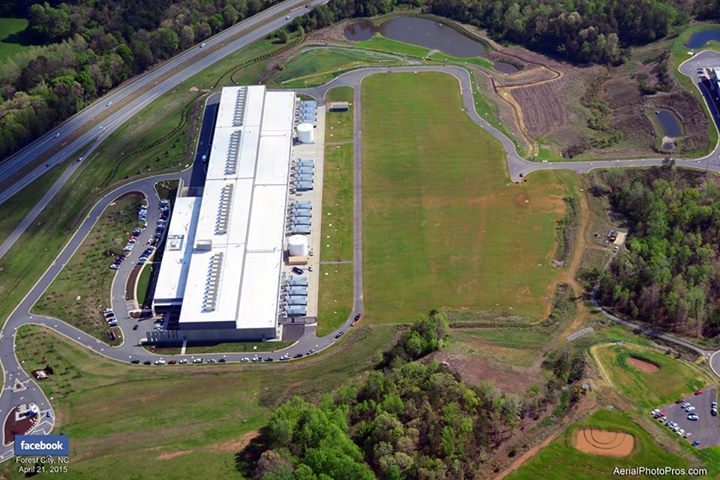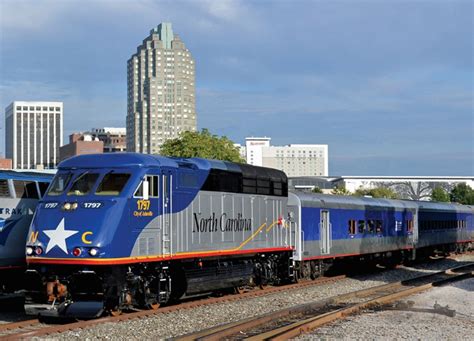By Lisa Sorg

A tweak to the zoning ordinance was the final step to closing the deal
Somewhere in Greenville — few know the precise location — dozens of shipping containers could soon appear on the landscape. These containers, known as “modular data-processing centers” — but that are actually cryptomining operations — will be jammed with lightning-fast computers whose blinking lights indicate they are thinking.
The computers are concentrating. They are mining cryptocurrencies, digital money like Bitcoin and Ethereum, by solving complex mathematical puzzles through trillions of guesses. It’s hard work, all this thinking. The computers get hot and must be constantly fanned.
All of this — the computers, the brain power, the fans — requires enormous amounts of electricity. Electricity generated largely by fossil fuels, the drivers of climate change. The same climate change that has increased the strength of hurricanes, like Hurricane Matthew, which flooded much of Pitt County in 2016. Or Hurricane Florence, which dumped 11.66 inches of rain on Greenville in 2018.
The Greenville City Council on Monday glossed over these environmental consequences of cryptomining, an energy glutton whose hunger for power knows no bounds. Instead, swayed by the promise of a $55 million economic investment by cryptomining hosting company Compute North and the 15 jobs it’s expected to create, the council voted 4-2 to amend a zoning ordinance that would allow behemoth “modular data processing centers” in industrial areas.
The zoning change was requested by the Greenville Eastern North Carolina Alliance, an economic development group. The most immediate beneficiary is Compute North, based in Eden Prairie, Minnesota.
The council did place some restrictions on these data/cryptomining centers: They can locate only on industrially zoned property that is at least 35 acres. They are subject to expanded buffers and setbacks from residences, and to decibel limits, in order to curb noise pollution.
But these confines don’t solve the significant environmental problems that cryptomining causes. In addition to their energy demands, they also generate tons of electronic waste in the form of computer hardware, which quickly becomes obsolete. Most of that waste can’t be disposed of in a traditional municipal landfill. Instead it can overwhelm local and regional recycling centers or is shipped overseas to developing countries where few, if any hazardous waste rules exist.
“Has enough thought gone into this?” said Molly Holdeman, as she read a letter by Dr. Earl Trevathan, a former city council member and a pediatrician. “There are significant negatives that aren’t being acknowledged. It employs few people and has no tangible products. Cryptomines are climate disasters.”
Compute North had initially eyed a separate parcel in Pitt County, outside the Greenville city limits, near a Black and Latino neighborhood and across the street from a school, Southerly magazine and Enlace Latino previously reported. Last November, opponents protested over concerns about the effects of noise pollution on residents and students from the hundreds of air conditioners needed to keep the computers cool. Compute North withdrew its plan shortly before the Pitt County Commission was scheduled to vote.
Undeterred, Compute North then looked for property still in Pitt County, but within Greenville’s jurisdiction. The company has refused to identify publicly or to Policy Watch where it might locate.
Yet given this week’s council decision, the properties that would meet the zoning criteria are on the city’s northeast side. (There are a few other large industrial tracts, but some lie within the 100-year or 500-year flood plain. The Tar River runs through the city.)
On Monday, neither the council, Compute North officials, nor any of the project’s backers would disclose why the company settled on the town, beyond the boilerplate “we’re excited to be part of Greenville.” How Compute North arrived in Pitt County is as cryptic as the currency itself.
Tom Kulikowski, board chairman of the Greenville Eastern North Carolina Alliance, though, certainly had a hand in it. He told council members during Monday’s virtual public hearing that he visited Compute North’s headquarters in Minnesota “at his own expense.”
“To win the economic development wars we need to embrace digital technology,” Kulikowski said, adding that these cryptomining operations can be a “springboard” for other businesses. Do our citizens and communities reject progress? Is that our reputation? Change takes courage. Digital assets are today’s currency.”
A 2019 University of Washington study contracts Kulikowski’s claims. Two cyber-security experts wrote that while cryptomining companies claim they will attract development and technology companies, they “offer few long-term benefits for the communities in which they are based.”
Since hosting a cryptomining operations is generally automated, they create few jobs. “Other than paying for the energy used, miners contribute little to the communities they operate in at the same time they can see significant personal economic benefit,” the experts wrote.
Story continues below the box

How does cryptomining work?
Cryptomining uses a network of high-powered computers to verify cryptocurrency — an alternative form of money, including Bitcoin or Ethereum. The allure of cryptocurrency is that it sidesteps banks and financial institutions. There are two ways to buy cryptocurrency: either purchase coins that are already in circulation through a currency exchange, or become a miner and receive new coins as a reward for the work.
Cryptocurrencies are unlike traditional cash transactions. If you bought a service or item using cryptocurrency, the funds would not be withdrawn from a bank account. Instead the virtual transactions are recorded in a public ledger, known as a “block chain.” Each transaction is saved as a “block.” (If you think of an old-school checkbook ledger, each entry would be a “block.”)
Those transactions, or blocks, must first be verified. This is where the “mining” comes in.
Compute North, which plans to build a modular center — meaning in shipping containers — in Greenville, does not itself mine cryptocurrency. It hosts the computers that do the mining. To use a gold mining analogy, Compute North would own the land where individual miners would pay a fee for the rights to pan for the precious metal.
Individual miners and their computers, such as those hosted onsite by Compute North, compete to solve complex mathematical problems to verify each crypto transaction — the block. These requires trillions of guesses and advanced computational power.
The miner who first solves the mathematical puzzle then verifies the block and adds it to the public ledger, or block chain. The payoff for miners is that they receive some amount of cryptocurrency. Yet cryptocurrency’s value is volatile. As of Thursday, Jan. 27, the value of one Bitcoin was $36,171. That’s a 47% drop from November 2021. The value of Ethereum, another popular cryptocurrency, had fallen 50% over the same time period.
Drake Harvey, chief operating officer of Compute North, told the Greenville City Council that the company can host other businesses, like high capacity video rendering, which also requires a lot of computing power. “We’re looking at other applications other than crypto to grow into,” Harvey said.
Greenville will be Compute North’s fourth outpost: They’ve established permanent facilities in an old World War II hangar in Big Spring, West Texas, and a former Gateway computing center in Sioux City, South Dakota. A modular facility, similar to that planned for Greenville, is in Kearney, Nebraska.
Compute North and other cryptomining hosting companies contend that despite their voracious energy demands — Bitcoin mining alone consumes as much energy annually as the entire country of The Netherlands — they help stabilize the grid. If there is too little demand for power, the companies can absorb the excess; if there’s a demand surge, such as during a natural disaster, they can quickly reduce their usage.
But the reverse could also be true. These companies can artificially ramp up energy demand, both via the mining process itself and the power required to run the fans to keep the computers cool.

The Greenville Utilities Commission provides electric, water, sewer and natural gas services to the City of Greenville and most of Pitt County. It buys power from Duke Energy. Tony Cannon, general manager and CEO of the GUC said Monday night it plans to enter into a five-year power purchase agreement with Compute North. There is enough capacity on the Greenville grid to meet the company’s demand for an extra 150 megawatts of power, Cannon said. (For context 150 megawatts is equivalent to more than twice the output of Duke Energy’s solar farm in Maiden, North Carolina.)
Compute North’s power bills could help offset costs of Greenville’s infrastructure upgrades, Cannon said, and help cover those related to adhering to the state and federal clean energy plans. Nonetheless, “these customers need a whole other accounting system,” Cannon told the council. “We don’t want to artificially increase rates and we don’t want to hurt other customer classes.”
Based on other states’ experiences, though, the financial challenge of meeting the energy demand of these crypto/data processing centers could raise rates for all Duke customers. A analysis conducted by the University of California, Berkeley reported that small businesses and households in upstate New York paid between $79 million and $165 million extra because of increased electricity use by crypto miners — “with little or no economic benefit,” the study said.
The Berkeley business professors who conducted the study found that local governments did benefit from additional real estate taxes; but after accounting for the cost of power, which might be discounted as part of incentives packages, that revenue “offset only about 15% of the increased costs to locals.”

It isn’t publicly known what, if any economic incentives Compute North could receive from the Greenville Utilities Commission. The commission board met in closed session four times last year — in July, October, November and December, to discuss Compute North, according to the commission’s attorney, Phil Dixon.
According to those meeting agendas, the discussions were “related to the location or expansion of industries or other businesses … including agreement on a list of economic development incentives that may be offered ….”
Minutes of closed sessions are not public until the matters are resolved. In an email response to a public records request from Policy Watch, Dixon wrote the minutes should not yet be available since “Compute North has not yet become a customer and since negotiations are continuing concerning where it will locate in Greenville or Pitt County as a customer of the Commission and under what terms, including possible economic development incentives.”
If the commission approves economic development incentives, it must do so in open session. That hasn’t happened yet.

Many companies that host cryptomines claim that they can use renewable energy to power their operations. However, that depends on the region’s energy mix. Even with inroads into renewables, most of the energy in North Carolina still comes from fossil fuels.
Last week, a U.S. House subcommittee held a hearing about the energy impacts of cryptocurrency. Chairman Frank Pallone (D-N.J.) did not mention Compute North by name, but did cite “one cryptomining facility in Kearney, Nebraska,” that co-located with a solar farm in an effort to use renewable energy. Nonetheless, Pallone said, that operation relies on at least a third of its power on fossil fuels.
It remains to be seen how Compute North’s need for electricity will affect Duke Energy’s clean energy mandate, the costs of which can be passed to ratepayers. As laid out in House Bill 951, which is now law, investor-owned utilities, such as Duke and Dominion, must reduce their carbon dioxide emissions in North Carolina by 70% by 2030, over 2005 levels.
Yet cryptomining emits large amounts of carbon. One estimate, presented before a congressional subcommittee last week, found that globally in 2021 carbon emissions from Bitcoin and Ethereum cryptomining to be 78.8 million tons of carbon—roughly equivalent to the tailpipe emissions from more than 15.5 million gasoline powered cars on the road every year.
Duke Energy spokesman Bill Norton told Policy Watch via email that, “as a regulated utility, we have an obligation to serve all customers. Projected load growth will be factored into the Carbon Plan proposal that we’re developing to meet North Carolina’s clean energy targets.”
Ann Maxwell, a member of Greenville’s Environmental Advisory Commission, told council members that Compute North’s presence conflicts with the city’s adopted plan to promote a green economy, including the reduction of greenhouse gas emissions. “This is not green energy,” Maxwell said. “We can’t do that with this project.”
Shortly before Monday’s vote by the Greenville City Council, Monica Daniels, who has served on Greenville City Council since 2019, said she was concerned about the level of support for the project. She and Councilwoman Rose Glover voted against the zoning. “Everyone who’s for it is affiliated with it in some way, ” Daniels said. “We can’t discredit the concerns of people in the neighborhood.”
Rick Smiley, who has served on City Council since 2013, said the vote should be based on “benefits to the county, Greenville and the Greenville Utilities Commission.” As for other issues, like global warming, “it’s a mistake to think this vote will affect that. This vote is not about those issues.”



